Analyzing the alignment of incentives, control, and economics in development agreements between private developers and mission-driven institutions
Author(s)
Reiche, F. Samuel (Ford Samuel)
DownloadFull printable version (1.265Mb)
Other Contributors
Massachusetts Institute of Technology. Center for Real Estate. Program in Real Estate Development.
Advisor
Peter Roth.
Terms of use
Metadata
Show full item recordAbstract
This thesis examines and analyzes the alignment of incentives, project control, and economics in development agreements between private developers and mission-driven institutions. Mission-driven institutions, such as churches, hospitals and universities, need to compete in their relative industries, and must leverage real estate assets as effectively as possible. In many cases, the best opportunities for underutilized institutional real estate is in the private market. In order to develop institutional real estate for the private market, institutions can partner with private development firms to utilize their knowledge and experience to maximize efficiency through complex development processes and create the best possible product for a given marketplace. This paper reviews existing literature on the topic of institutional-private development partnerships, then explains and analyzes two case studies: The Charles Street Jail, and a Market Rate Student Housing Project. The case studies act as real examples, and are used to examine the issues that can arise due to differences in incentives between private developers and mission-driven institutions, as well as possible ways that organizations can approach such concerns to mitigate associated risks.
Description
Thesis (S.M. in Real Estate Development)-Massachusetts Institute of Technology, Program in Real Estate Development in Conjunction with the Center for Real Estate, 2013. This electronic version was submitted by the student author. The certified thesis is available in the Institute Archives and Special Collections. Cataloged from student-submitted PDF version of thesis. Includes bibliographical references (pages 65-66).
Date issued
2013Department
Massachusetts Institute of Technology. Center for Real Estate. Program in Real Estate Development.; Massachusetts Institute of Technology. Center for Real EstatePublisher
Massachusetts Institute of Technology
Keywords
Center for Real Estate. Program in Real Estate Development.